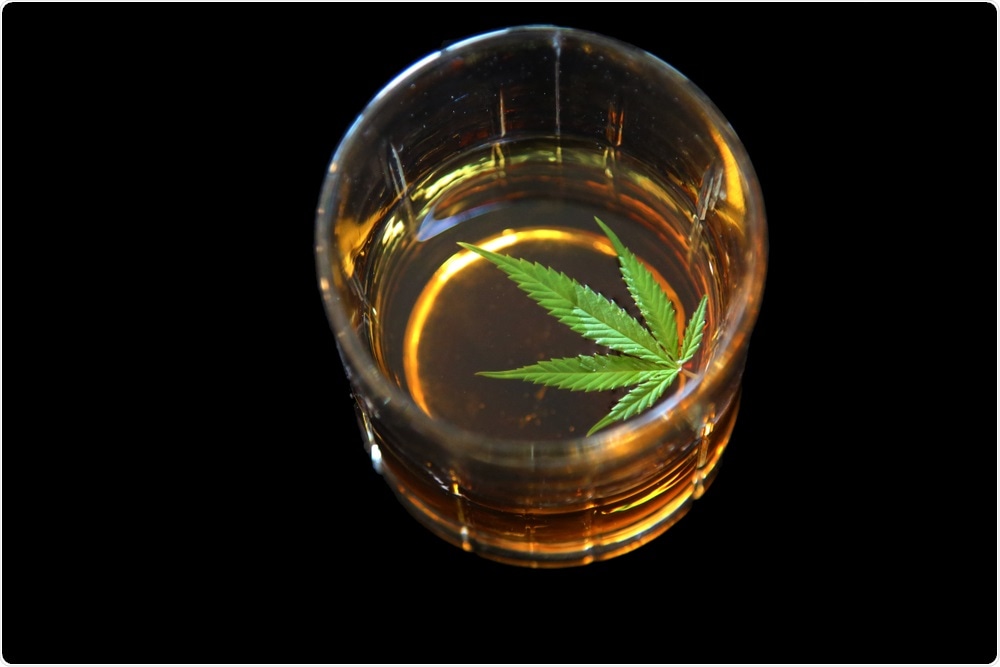The abuse of alcohol and other drugs like narcotics, sedatives and stimulants continues to be a major global public health concern. This international crisis is further heightened by the tendency of many users to poly-drug abuse, which is a condition defined as the simultaneous or successive abuse of more than one drug or type of drug by an individual who has dependence on at least one of those drugs.
Understanding the mechanisms behind the interactions that exist between different drugs can provide researchers, clinicians and other healthcare professionals with important information on the severity of their side effects. Such research into the interaction of alcohol and cannabis will be imperative, as cannabis becomes legalized in many American states.
 mikeledray | Shutterstock
mikeledray | Shutterstock
Pharmacokinetics
Immediately after alcohol is ingested, it undergoes first-pass metabolism in the stomach and then the liver. The primary enzymes that are involved in the metabolism of alcohol include alcohol dehydrogenases (ADHs), which function to metabolize alcohol into acetaldehyde, as well as aldehyde dehydrogenases (ALDHs), which function to metabolize aldehyde into acetate.
Cytochrome P450 enzymes (in particular CYP2E1, CYP1A2 and CYP3A4), primarily function to metabolize alcohol, drugs and pharmaceutical agents. When these cytochrome P450 enzymes are activated by alcohol, the metabolism and excretion of drugs by liver CYP enzymes can be affected or even inhibited completely. Hence, if enzymes are inhibited, the drug’s availability in the body can increase, resulting in heightened adverse effects.
Cannabis and opioids, for example, have consistently demonstrated a poor response when taken following alcohol consumption. While this may be true, the data on how alcohol exposure interacts with cannabis are not entirely clear.
While Toenne et al. demonstrated that alcohol increases the half-life of cannabis and reduces the concentration of this substance in the blood, both Hartman et al. and Lukas et al. showed contrary evidence that alcohol consumption caused significant increases in the concentrations of the cannabis metabolite 11-OH-tetrahydrocannabinol (THC) and cannabidiol (CBD).
Pharmacodynamics
Research into the pharmacodynamic interaction between alcohol and drugs aims to elucidate the effects of drug combinations at specific target sites, as well as determining how the two substances can influence each other’s effect(s).
Alcohol, cannabis and opioids are all neuro-inhibitory drugs, which means that they develop an inhibitory postsynaptic potential (IPSP). Therefore, when drugs like alcohol and cannabis are taken together, an additive or synergistic effect can occur to enhance the inhibitory effects of these drugs.
Furthermore, the coinciding consumption of both alcohol and cannabis can create an augmented effect of this drug combination, which can magnify their similar behavioral effects such as euphoria, analgesia, sedation, hypothermia, as well as the occurrence of cognitive and/or motor impairments. It is important to note that, over time, chronic cannabis users have been shown to develop a tolerance to the impairing effects of cannabis and/or alcohol.
Neurotransmitter-based mechanisms
Numerous neurotransmitter (NT) systems exist within the body, some of which include glutamate (Glu), glycine (Gly), serotonin (5-HT) and endogenous opioids (eOPs). The receptors of all NT systems play a role in various psychological processes like reward and addictive behavior.
While GABA and Glu are key NT targets of alcohol, THC, which is the primary psychoactive component of cannabis, has been associated with causing potentially long-term effects on the dopamine (DA) system.
Epigenetic mechanisms
The molecular basis of the alcohol and cannabis interaction is poorly understood. While this may be true, various studies have demonstrated that certain epigenetic mechanisms, such as nuclear factors, histone modifications and the methylation of DNA strands, can play a role in how this interaction proceeds.
Studies have pointed to the histones, H3K9ac, H3K9me, H3K4me, H3K8ac, H3K36me and H3Ser10/28p. Nuclear factors that have been associated with the alcohol-cannabis interaction include CERB, CBP and NkkB, whereas epigenetic enzymes include DNMT, HAT, HDAC, HMT and HDM.
Source:
Singh, S. K. (2019). Alcohol interaction with cocaine, methamphetamine, opioids, nicotine, cannabis and γ-hydroxybutyric acid. Biomedicines 7(16). DOI: 10.3390/biomedicines7010016.